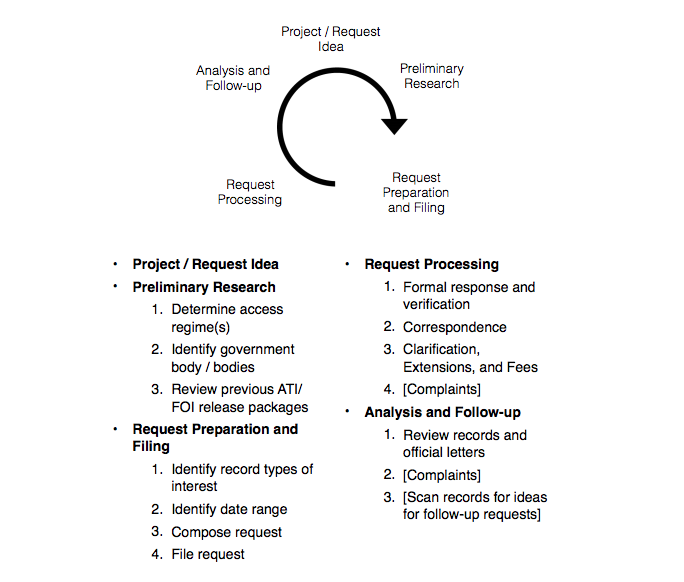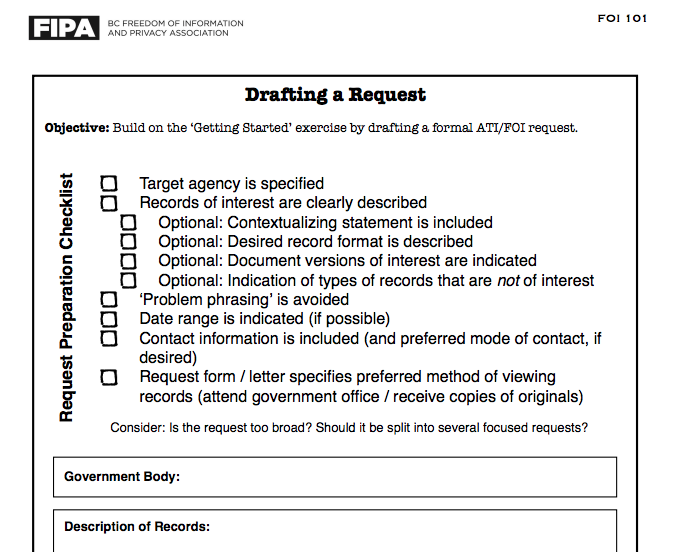September 28 is celebrated as the International Day for Universal Access to Information (IDUAI) and the week around this day is sometimes commemorated as Freedom of Information (FOI) Week.
As part of FOI week this year, the BC Freedom of Information and Privacy Association (FIPA) where former Digital Tattoo Project Coordinator, Bryan Short is now Program Director, held an Introduction to FOI workshop at UBC. FOI was a great tool for a lot of the work Bryan did while at Digital Tattoo. Bryan recently wrote a guest post reflecting on FOI as activism. You can also read about some of his other Digital Tattoo work here.
What is FOI/ATI?
The term Access to Information (ATI) is often interchangeably used alongside Freedom of Information (FOI) or Right to Know (R2K/RTK). The right of access to information provides for your right to access records and information under the control of a government institution.
This is a globally recognized right. FOI laws are becoming increasingly important as more governments move towards open, democratic and transparent models. In Canada, this right is federally provided for through the Access to Information Act and in BC through the Freedom of Information and Protection of Privacy Act (FIPPA).
Why is FOI important for you?
Universal Access to Information is one of the United Nation’s Sustainable Development Goals (SDGs) under the new 2030 Development Agenda. Goal 16, Target 10 (16.10) calls for ensuring public access to information.
The right to seek and receive information is recognized as a crucial part of the right to freedom of expression which is covered by the Universal Declaration of Human Rights (UDHR) and the International Covenant on Civil and Political Rights (ICCPR).
This basically grants you the right to request access to records and information held by public bodies, including your personal information. An extension of this could include protection of your personal information by public bodies and being able to request the correction of your personal information in records held by them.
The University of British Columbia as a public research university is a public institution that you could make information requests to either for your personal information or information you think should be publicly available.

The FOI Cycle by Mike Larsen and BC FIPA available at https://fipa.bc.ca/wordpress/wp-content/uploads/2019/03/FIPA_FOI101_Handout_July-2018.pdf
The Freedom of Information Process
During the Introduction to FOI workshop, FIPA President Mike Larsen, discussed the FOI cycle process. This begins when you identify some information you need from a government institution. This could be your personal information or other relevant information accessible to the public.
The cycle involves carrying out your preliminary research on this issue to find out what relevant government body is responsible for this information, and previous FOI requests related to this.
It goes on to the request preparation and filing, processing, analysis and follow up stages until the requested information is retrieved and given to you.
What kinds of information can you access?
The ATI Act states that citizens and permanent residents have “a right to and shall, on request, be given access to any record under the control of a government institution.” FIPPA applies to all records in the custody or under the control of a public body, including court administration records.
Students have used their right to access information in various ways.
Bryan Short used FOI to find out about personal information recorded by Blackboard Connect, UBC’s Learning Management System (LMS) at the time (which is now Canvas), how learning analytics affected the calculation of a grade within Connect, and how much information was being retained.
You have the power to request information from UBC’s records as you have the right to access any data and records containing your personal information.
However, it goes beyond your personal information. Students have also used FOI to investigate university spending, public interest issues or to get information for projects, dissertations, theses and other research work where such information is held by a public body.
Both FIPPA and the ATI Act include clauses on information exempted from FOI ie. information that cannot be accessed using FOI such as:
- a record of a question that is to be used on an examination or test;
- a personal note, communication or draft decision of a person who is acting in a judicial or quasi-judicial capacity;
- material placed in the digital archives or the museum archives of government by or for a person or agency other than a public body;
- a record containing teaching materials or research information of
- a faculty member, as defined in the College and Institute Act and the University Act, of a post-secondary educational body
- a teaching assistant or research assistant employed at a post-secondary educational body, or
- other persons teaching or carrying out research at a post-secondary educational body
- material placed in the archives of a public body by or for a person or agency other than a public body;
- a record that is available for purchase by the public;
- a record of a service provider that is not related to the provision of services for a public body.
Some information is proactively disclosed by the government while some need to be requested. There are also some records that are subject to exemptions and cannot be disclosed under FOI.
Government bodies have a responsibility to keep records and assist with FOI requests but where the information you need has not been recorded or placed in a record, the government is not required by law to produce a record for you.
While making an FOI request, it is important to be as specific as possible to ensure you get the exact information you need. FIPA has a request preparation checklist available online.

FOI Request Preparation Checklist by FIPA available at https://fipa.bc.ca/wordpress/wp-content/uploads/2019/03/FIPA_FOI101_Handout_July-2018.pdf
You have a right to access government information which might be relevant for you personally, for your work or in relation to your studies. You can also use this right creatively and to advocate for this or other rights such as allied privacy and data protection rights.
The choice is yours. As with all rights, use this in the best way possible.
- Have you made an FOI request? What was this experience like?
- What information could government bodies hold about issues you are interested in?
- Is there information you would like from UBC that can be obtained through an FOI request?
Resources
- Access to Information Act https://laws-lois.justice.gc.ca/eng/acts/a-1/
- Freedom Of Information And Protection Of Privacy Act (FIPPA) http://www.bclaws.ca/civix/document/id/complete/statreg/96165_00
- Open Government Canada https://open.canada.ca/en
- Access to Information Canada https://open.canada.ca/en/access-to-information
- Guide to Access and Privacy Protection under FIPPA (2015) | Office of the Information and Privacy Commissioner for British Columbia https://www.oipc.bc.ca/guidance-documents/1466
- BC Freedom of Information and Privacy Association https://fipa.bc.ca/get-help/
- The Freedom of Information Act and Higher Education: The experience of FOI officers in the UK https://www.ucl.ac.uk/constitution-unit/sites/constitution-unit/files/he-foi-officers-survey-report.pdf
- How students use FOI to investigate their universities https://www.theguardian.com/education/2015/nov/24/how-students-use-foi-to-investigate-their-universities
Written by: Eseohe Ojo
Edited by: Samantha Summers
Photos from: FIPA and Government of Canada Websites.
Featured Image: “Files,” by EvelynGiggles on Flickr, used under CC licensing.

